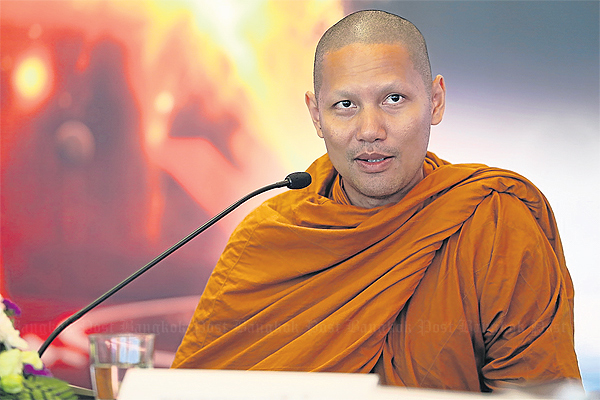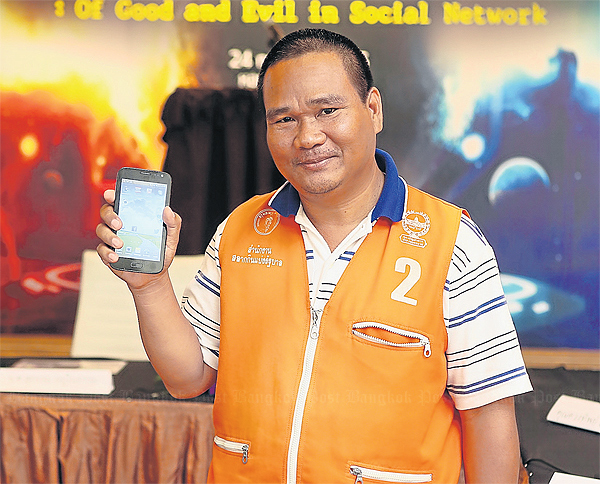
Phra Pornpol Pasanno.
Three prominent web users discuss the rise in social networks
A motorcycle-taxi driver who became a Twitter king, a YouTube comedy sensation, a monk who spreads dhamma online. This diverse group of online personalities recently gathered for a panel discussion titled Digital Agenda Thailand: Of Good And Evil In Social Network to share their views on how the new platform affects modern life.
Dejchart Phuangket makes a living driving a motorcycle taxi, but he's also an online sensation through his blogs, tweets and Facebook posts. His big break came last year when he was on the scene tweeting pictures of the Sukhumvit bomber who blew his leg off.
 Duangthip Chomprang.
Duangthip Chomprang.
Dejchart was quickly approached by global news agencies that wanted to use his photo in their reports.
"The social network is helpful for the grassroots people," said Dejchart at the panel discussion, held by Institute of Social and Economic Policy (Isep).
If you Google "document delivery at Thong Lor-Ekamai area" or "Messenger in Bangkok", you will find Dejchart's name ranked at the top, together with his telephone number and tag. Today his twitter account @motorcyrubjang has more than 10,000 followers, he has more than 2,900 Facebook fan pages and also has a blog.
"Using Twitter enables me to be called more than other motorcycle taxis," said Dejchart, who also uses his free time to teach his friends at the motorcycle-taxi queue about Facebook and Twitter.
However, the dark side of the social network, according to Dejchart, is that it becomes a new way to cheat people who're not very tech savvy. This ranges from being duped into buying fake products to money transfers and other illegal scams.
For Anny Sararat Saejew, a university student who became popular on YouTube with her lip-sync video of comedian Tukky, the social network is a new way for people to become famous. It's the fastest way "to become somebody".
Anny did not expect to ride the wave of fame _ but her number of viewers went up steeply because of her funny imitation of the comedian, and the clip now has 300,000 hits.
Fame can be turned into financial benefit, she said, and this is something that young people today are aware of.
"Youngsters today want to others to 'Like' them, the more 'Likes' they get, the cooler they feel. So whatever they do, they hope for the 'Like'," explained Anny. "I also feel good any time I get a 'Like' for my photos."
Today, Anny has a big fan club who follow her daily life, but none of us is immune to attention, and Facebook is shaping the way we perceive ourselves.
 Sittichai Theppaitoon.
Sittichai Theppaitoon.
But while the social network may seem to be all about "me", there are others who use it for selfless ends.
According to Phra Pornpol Pasanno from Rama IX Golden Jubilee Temple, known as "Luang Pee Boat", there are many channels to spread dhamma to Buddhists, and the social network has become the most influential channel at present. Do it the right way, the monk said, and it will bring many advantages to the religion.
A recent monk scandal has prompted the Sangha Supreme Council of Thailand to warn clergy not to be liberal with their use of online media.
But Phra Pornpol pointed out if online activities do not breach moral precepts, they should be allowed. The Millennial generation is familiar with online rather than traditional books, so the digital media are another promising channel to promote Buddhism to teenagers.
Young people play games to win as they are interested in themselves. But games can be good for children if they are designed to encourage players to help society instead of themselves. "In the future, we can bring dhamma into the form of animation and games so that more people are interested in it," the monk said.
Sittichai Theppaitoon, president of the Thai Software Game Industry Association who developed Dummy, a hit game on Facebook, pointed out the benefit of social networks is that users can play games for free.
And the one-player games of today will evolve into multi-player games, bringing people together to play and collaborate with each other.
Duangthip Chomprang, manager of Internet Society Asia Regional Affairs, noted that technology has no inherent danger, and likewise neither does the internet and social networks. The social network was created so that everyone can share and learn across borders, traditional or psychological. The world of the internet is the world of freedom, but it must be viewed broadly and through various dimensions. That's the way people can develop new ideas and get the most from the technology that's now shaping the way we live our lives.

Anny Sararat Saejew.

Dejchart Phuangket.



